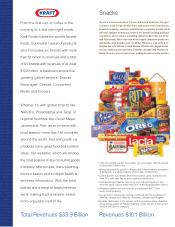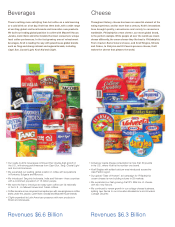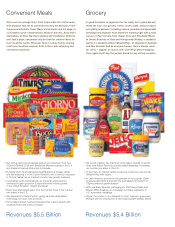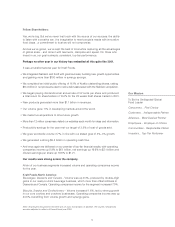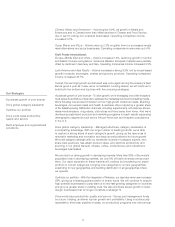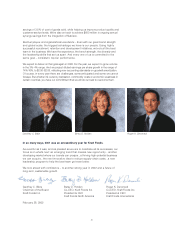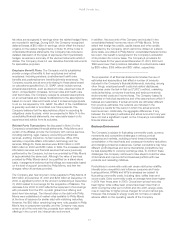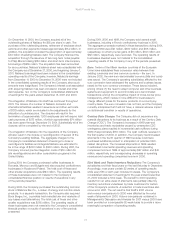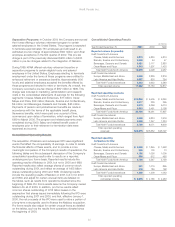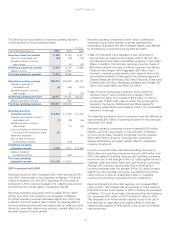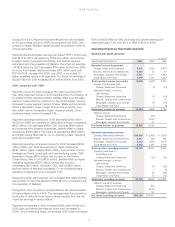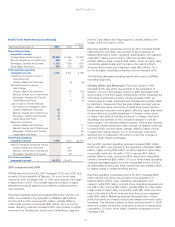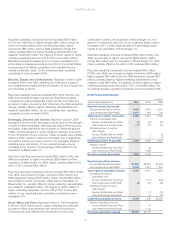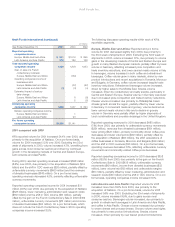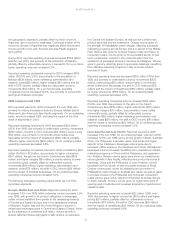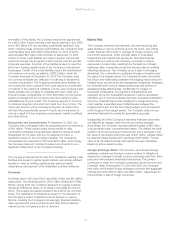Kraft 2001 Annual Report Download - page 30
Download and view the complete annual report
Please find page 30 of the 2001 Kraft annual report below. You can navigate through the pages in the report by either clicking on the pages listed below, or by using the keyword search tool below to find specific information within the annual report.
Kraft Foods Inc.
24
On December 11, 2000, the Company acquired all of the
outstanding shares of Nabisco for $55 per share in cash. The
purchase of the outstanding shares, retirement of employee stock
options and other payments totaled approximately $15.2 billion. In
addition, the acquisition included the assumption of approximately
$4.0 billion of existing Nabisco debt. The Company financed the
acquisition through the issuance of two long-term notes payable
to Philip Morris totaling $15.0 billion and short-term intercompany
borrowings of $255 million. The acquisition has been accounted
for as a purchase. Nabisco’s balance sheet was consolidated with
the Company as of December 31, 2000, and beginning January 1,
2001, Nabisco’s earnings have been included in the consolidated
operating results of the Company; however, Nabisco’s earnings
from December 11, 2000 to December 31, 2000 were not included
in the consolidated operating results of the Company since such
amounts were insignificant. The Company’s interest cost associated
with acquiring Nabisco has been included in interest and other
debt expense, net, on the Company’s consolidated statements
of earnings for the years ended December 31, 2001 and 2000.
The integration of Nabisco into Kraft has continued throughout
2001. The closure of a number of Nabisco domestic and
international facilities resulted in severance and other exit costs
of $379 million, which are included in the adjustments for the
allocation of purchase price. The closures will result in the
termination of approximately 7,500 employees and will require total
cash payments of $373 million, of which approximately $74 million
has been spent through December 31, 2001. Substantially all of the
closures will be completed by the end of 2002.
The integration of Nabisco into the operations of the Company
will also result in the closure or reconfiguration of several of the
Company’s existing facilities. The aggregate charges to the
Company’s consolidated statement of earnings to close or
reconfigure its facilities and integrate Nabisco are estimated to
be in the range of $200 million to $300 million. During 2001, the
Company incurred pre-tax integration costs of $53 million for
site reconfigurations and other consolidation programs in the
United States.
During 2001, the Company purchased coffee businesses in
Romania, Morocco and Bulgaria and also acquired confectionery
businesses in Russia and Poland. The total cost of these and
other smaller acquisitions was $194 million. The operating results
of these businesses were not material to the Company’s
consolidated financial position or results of operations in any
of the periods presented.
During 2000, the Company purchased the outstanding common
stock of Balance Bar Co., a maker of energy and nutrition snack
products. In a separate transaction, the Company also acquired
Boca Burger, Inc., a privately held manufacturer and marketer of
soy-based meat alternatives. The total cost of these and other
smaller acquisitions was $365 million. The operating results of
these businesses were not material to the Company’s consolidated
financial position or results of operations in any of the periods
presented.
During 2001, 2000 and 1999, the Company sold several small
businesses, including a French confectionery business in 2000.
The aggregate proceeds received in these transactions during 2001,
2000 and 1999 were $21 million, $300 million and $175 million,
respectively, on which pre-tax gains of $8 million, $172 million and
$62 million, respectively, were recorded. The operating results of
businesses divested were not material to the consolidated
operating results of the Company in any of the periods presented.
Euro: Twelve of the fifteen member countries of the European
Union have established fixed conversion rates between their
existing currencies and one common currency—the euro. In
January 2002, the new euro-denominated currency (bills and coins)
was issued. The Company’s operating subsidiaries affected by the
euro conversion have addressed the systems and business issues
raised by the euro currency conversion. These issues included,
among others: (1) the need to adapt computer and other business
systems and equipment to accommodate euro-denominated
transactions; and (2) the competitive impact of cross-border price
transparency, which makes it more difficult for businesses to
charge different prices for the same products on a country-by-
country basis. The euro conversion has not had, and the Company
currently anticipates that it will not have, a material adverse impact
on its financial condition or results of operations.
Century Date Change: The Company did not experience any
material disruptions to its business as a result of the Century Date
Change (“CDC”). The Company’s increases in 1999 year-end
inventories and trade receivables caused by preemptive CDC
contingency plans resulted in incremental cash outflows during
1999 of approximately $155 million. The cash outflows reversed in
the first quarter of 2000. In addition, the Company had increased
shipments in the fourth quarter of 1999 because customers
purchased additional product in anticipation of potential CDC-
related disruptions. The increased shipments in 1999 resulted
in estimated incremental operating revenues and operating
companies income in 1999 of approximately $97 million and $40
million, respectively, and corresponding decreases in operating
revenues and operating companies income in 2000.
53rd Week and Trade Inventory Reductions: The Company’s
subsidiaries end their fiscal years on the last Saturday in December.
Accordingly, most years contain 52 weeks of operating results
while every fifth or sixth year includes 53 weeks. The Company’s
consolidated statement of earnings for the year ended December
31, 2000 included a 53rd week. The benefit to 2000 operating
results from an extra week of shipments was partially offset by
inventory reductions undertaken by trade customers for certain
of the Company’s products. A reduction in trade inventories also
occurred in 2001. The net result is that Kraft’s 2001 volume
and revenue comparisons to 2000 were affected by the extra
week of shipments in 2000. Volume comparisons contained in
Management’s Discussion and Analysis for 2001 versus 2000 have
been provided on a comparable 52-week basis to provide a more
meaningful comparison of operating results.



